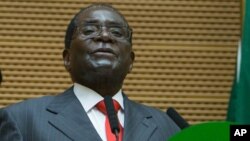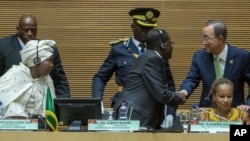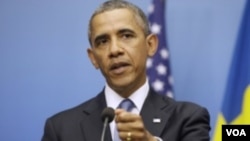Zimbabwe President Robert Mugabe ended his year-long term as the chair of the African Union body, with a nearly hour-long speech that seemed to indicate an increasing intolerance for the West’s involvement in Africa’s affairs.
President Mugabe instructed United Nations Secretary General Ban Ki Moon, who was in attendance, to tell the West to “shut their mouths,” in voicing its opposition to his 35-year rule, or that of other revolutionary parties like Tanzania’s Chama Cha Mapinduzi, which recently retained control of the government through an election.
“Regime change, Mugabe should not be there, we want someone else,” Mr. Mugabe mocked, referring to U.S. and other Western countries that he has accused often of trying to oust him by strengthening the opposition and civil society groups.
While rumors of ill-health due to his advanced age, and infighting in his Zanu-PF party have raised speculation about his ability to remain in power, Mr. Mugabe, who turns 92 next month, said as long as he's alive, he'll be in charge.
"“I will be there until God said come, and join the others. But as long as I am still alive, I’ll still have the punch,” said President Mugabe to rousing applause.
A long-time critic of the UN, President Mugabe, however, spared Mr. Ban of any wrong, despite the fact that Ban, who is from South Korea, is nearing the end of his second and final five-year term as UN Chief.
“But you [Ban] have done a good job for us. You have visited our countries, you have wept with us where disease has visited us, whether it was Ebola, or some other, where calamities have occurred, where fights have taken place, where terrorism has also affected us. We thank you for that,” said Mr. Mugabe, adding, “of course you don’t come from those countries.”
Among President Mugabe’s biggest gripe with the UN body, is the absence of Africa in the crucial decision-making Security Council, which comprises five permanent members with veto power – the U.S., France, Britain, China and Russia – while the rest of the countries serve on a rotational basis, with little influence.
President Mugabe and other African leaders have been pushing for Africa to have at least two permanent seats in the Security Council, with equal veto power, arguing that Africa’s 54-member countries justify the need for a say in crucial decisions, many of which affect the continent.
“But no, two members, 54 countries here, this is the body, the body of respected people. The body of Africa,” President Mugabe stressed, again urging Mr. Ban to deliver his message.
“Tell them, tell them we are not ghosts, that we also belong to the world … part of the world called Africa, and Africans shall no longer tolerate a position of slavery, slavery by any other name. By denial of rights, slavery by being treated in a manner we regard as not equal to the manner in which they treat themselves.”
Failure by the UN to reform per Africa’s request, President Mugabe suggested a mass exodus of African countries from the body, as was proposed in the case of the International Criminal Court, which has been accused of targeting African countries, though many are members.
“If we decide as we shall certainly do so one of these days, that down with the United Nations, we are not members of it, others are real members of it, we are artificial members of it, and we, we can’t continue to be artificial members of it,” said Mr. Mugabe.
“If the United Nations is to survive, we must be equal members of it. Equal members, members … who can say when we go to the body, that we can now, speaking truly as members with a voice that is understood, respected and honored. “
Taking the argument further, President Mugabe, who was interrupted often with loud applause and at times standing ovation from the member countries, questioned the location of the UN headquarters – New York – saying it should be where the majority of its members are, namely Africa and Asia.
“Where do you have most of the people?” Mr. Mugabe queried, after calculating that more than three billion just in China, India and Africa, alone.
“Now put us together, just us three, and then put those with the white faces and pink noses, put them together against us. How many are there, even man to a man? And do we allow that that group should continue harassing us, even in our independent countries?”
PRESIDENT BARACK OBAMA:
In attacking the West, President Mugabe has been specially critical of the U.S. which has imposed targeted sanctions on the country as a pre-condition for better governance and human rights practices.
While in the past Mr. Mugabe was quick to attack by name, former U.S. President George Bush who signed into law the controversial Zimbabwe Democracy And Economic Recovery Act (ZIDERA) in early 2000, the name of current U.S. President Barack Obama, has been used more sparingly.
However, in his speech, President Mugabe took a swipe at the U.S.’s first president of color, insinuating that President Obama, has no real power because of his race.
“There is (President) Obama today, yes, but what is he? What is he? A voice to speak their language, to act their act. And not our act, but their act. They are still superiors.”
President Mugabe referred to a predominantly African-American neighborhood in New York city, Harlem, where he said not much is said about the injustices against blacks there, while Western countries are quick to raise alarm over similar situations in African countries.
“The blacks, when you go to Harlem, you’ll shed tears today,” said Mr. Mugabe. There is no education for all. No health (care) for all. Blacks in the streets, and nobody seems to talk about it. But they (whites) instead, still want to talk about us. “
President Mugabe accused the West of falsely using its advocacy role against injustice as a means to enter African countries and force change of governments.
“They are everywhere in Africa. If not physically, through NGOs (loud applause) through spies, through pretenders who come to us and say they are here in Africa to assist us. Even in groups, armed groups in some of our territories. What help is coming from them? Regime change,” Mr. Mugabe concluded.
A SELF-SUFFICIENT AFRICA
President Mugabe and his government adopted a “Look East” policy a few years ago, to counter its growing isolation from the West and the assistance that came with it.
President Mugabe in his speech, indicated a similar trend across Africa, where he referred to “enhanced cooperation between Africa and its strategic partners,” in 2015. Several big forums took place in 2015 between African countries and India and China, namely the 3rd Africa –India Summit, which took place in India, and the Forum for China-Africa Cooperation (FOCAC), in South Africa, immediately following Chinese President Xi Jinping’s to Zimbabwe.
President Mugabe described the partnerships as “important platforms to advance our (Africa) agenda, with a view to ensuring mutual benefit and win-win cooperation.”
Beyond the partnerships, however, President Mugabe also stressed on the importance of the African Union members to be current in their member fees, and also take more financial ownership of the AU’s own initiatives such as long-term Agenda 2063, that sets development targets for Africa over the next 50 years.
“The Assembly took a principled position to progressively meet from our own resources, the bulk of our budget in order to ensure and safeguard the ownership of African Agenda and processes by Africans,” said President Mugabe.
“By the end of the next 5 years, beginning in 2016, we must meet 100% of our operations budget, 75% of our programs budget and 25% of the peace and security budget.”
Mr. Mugabe noted that “the implementation of this commitment would be a clear demonstration of our will and commitment to our organization, the African Union and will enable Africa to occupy its rightful place in the community of nations.”
He also stressed the need to step up industrialization which the Zimbabwean leader said is the key to uplifting the lives of citizens by creating unemployment and ending poverty.
“We must not spare efforts to push for the industrialization of our countries and regions with value addition and beneficiation at the core. Implementation of the African Industrialization Strategy should be prioritized.”
Despite challenges that Africa faces in terms of hot spots such as Libya, Somalia, South Sudan and several others, President Mugabe said overall, "Africa has come of age and that democracy is alive on our continent."
President Mugabe handed over chairmanship of the AU to Chadian President Idriss Deby.















